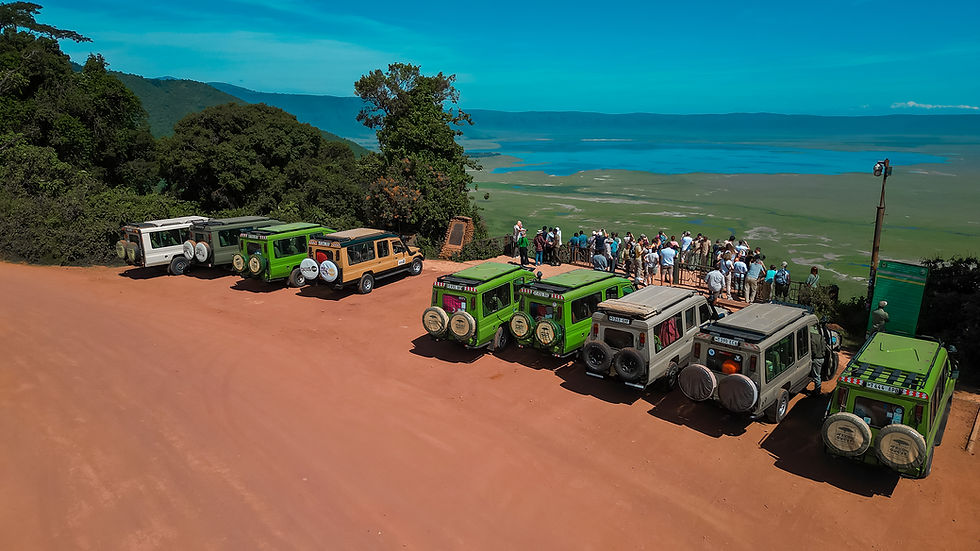Over View
Ngorongoro Crater – A Natural Wonder
Ngorongoro Crater in Tanzania is the world’s largest intact volcanic caldera, spanning 260 km² with walls rising 610 meters high. Formed over 2-3 million years ago, it’s a UNESCO World Heritage Site and part of the Ngorongoro Conservation Area.
Why Visit?
✅ Wildlife Haven – Home to the Big Five (lions, elephants, rhinos, leopards, buffaloes) and thousands of other animals in a compact, easily explorable area.
✅ Stunning Scenery – Lush forests, soda lakes (like Lake Magadi), swamps, and open plains.
✅ Cultural Experience – Maasai tribes live in harmony with wildlife, offering cultural tours at it rim.
✅ Year-Round Safari Destination – Excellent game viewing any time, but best in the dry season (June-October).
Quick Facts
-
Depth: 610 meters
-
Wildlife: ~25,000 large animals (highest density of predators in Africa).
-
Unique Feature: One of the few places to see wild black rhinos in Tanzania.
A visit to Ngorongoro Crater guarantees unforgettable wildlife encounters in one of Africa’s most breathtaking landscapes.
What to see
As a tourist visiting Ngorongoro Crater, you can witness an incredible variety of wildlife, stunning landscapes, and cultural experiences. Here’s what you can see:
1. Wildlife (The Big Five & More)
-
Lions – One of the highest densities in Africa, often seen lounging or hunting.
-
Black Rhinos – Critically endangered, but Ngorongoro is one of the best places to spot them.
-
Elephants – Large bulls with impressive tusks, often near Lerai Forest.
-
Buffaloes – Massive herds grazing on the crater floor.
-
Leopards – More elusive but sometimes seen in trees or rocky areas.
-
Hippos – Gather in large numbers at Ngoitokitok Springs and Lake Magadi.
-
Hyenas – Both spotted and striped hyenas scavenge and hunt.
-
Wildebeests & Zebras – Thousands graze in the crater year-round.
-
Cheetahs – Occasionally seen sprinting across the plains.
2. Birdlife (Over 500 Species)
-
Flamingos – Thousands gather at Lake Magadi, creating a pink spectacle.
-
Kori Bustard – The world’s heaviest flying bird.
-
Secretary Birds – Unique raptors that hunt snakes.
-
Ostriches – Often seen running across the grasslands.
-
Eagles & Vultures – Soaring above, especially near kills.
3. Stunning Landscapes
-
The Crater Floor – A vast, flat plain surrounded by steep walls, offering 360° views.
-
Lake Magadi – A shallow alkaline lake attracting flamingos and other waterbirds.
-
Lerai Forest – A dense yellow fever acacia woodland where elephants and leopards hide.
-
Gorigor Swamp – A marshy area attracting buffaloes, hippos, and birds.
-
Ngoitokitok Springs – A picnic spot with hippo pools and freshwater streams.
4. Maasai Culture
-
Traditional Bomas (Villages) – Visit Maasai communities at crater rim bomas to see their way of life, dances, and crafts.
-
Maasai Herders – Often seen guiding cattle along the crater rim.
5. Archaeological Sites (Nearby the Crater)
-
Olduvai Gorge – Known as the "Cradle of Mankind," with early human fossils.
-
Laetoli Footprints – 3.6-million-year-old hominid footprints preserved in volcanic ash.
6. Scenic Views from the Rim
-
Sunrise/Sunset – Stunning colors over the crater from viewpoints like Seneto or Lodare.
-
Mist & Clouds – The crater often fills with morning mist, creating a magical atmosphere.
Best Time for Sightings
-
June-October (Dry Season) – Best for wildlife, as animals gather around water sources.
-
November-May (Green Season) – Lush scenery, migratory birds, and fewer crowds (but some roads may be muddy).
Ngorongoro Crater is like a natural zoo where you’re guaranteed to see an abundance of wildlife in a breathtaking setting.
What to do
Ngorongoro Crater in Tanzania is a UNESCO World Heritage Site and one of Africa’s most spectacular wildlife destinations. Tourists can enjoy a variety of activities, including:
1. Game Drives (Safari)
-
The main attraction is wildlife viewing in the crater, home to the Big Five (lion, leopard, elephant, buffalo, and rhino).
-
Spot other animals like zebras, wildebeests, hippos, hyenas, and flamingos (at Lake Magadi).
-
Best time: Early morning for predator activity and excellent lighting for photography.
2. Walking Safaris
-
Explore the Ngorongoro Highlands with guided walks outside the crater.
-
Visit Empakaai Crater or Ol Doinyo Lengai (active volcano) for stunning views.
-
Interact with Maasai guides and learn about local flora and fauna.
3. Cultural Visits to Maasai Villages
-
Experience Maasai culture by visiting a boma (traditional village).
-
Witness traditional dances, learn about their customs, and buy handmade crafts.
4. Bird Watching
-
Over 500 bird species can be spotted, including flamingos, ostriches, and kori bustards.
-
Best spots: Lake Magadi, Lerai Forest, and Gorigor Swamp.
5. Picnicking at designated sites
-
Enjoy a packed lunch at scenic spots like Ngoitokitok Picnic Site near a hippo pool.
6. Photography & Scenic Views
-
Capture breathtaking landscapes, wildlife, and sunrise/sunset views from the crater rim.
-
Popular viewpoints: Seneto, Lemala, and Lodare.
7. Visit Olduvai Gorge (Cradle of Mankind)
-
A short drive from Ngorongoro, this archaeological site has fossils of early humans (like Homo habilis).
8. Hiking & Trekking
-
Hike the Ngorongoro Highlands or trek to Ol Doinyo Lengai (for adventurous travelers).
-
Explore Gol Mountains and Nasera Rock.
9. Camping & Luxury Lodges
-
Stay at lodges on the crater rim (e.g., Ngorongoro Serena, Sopa Lodge) or camp at Simba Campsite.
-
Some offer night game drives (outside the crater).
Best Time to Visit
-
June-October (Dry season) – Best for wildlife viewing.
-
November-May (Green season) – Lush scenery, fewer crowds, and birdwatching.
The Ngorongoro Crater offers an unforgettable mix of wildlife, culture, and adventure, making it a must-visit in Tanzania!












